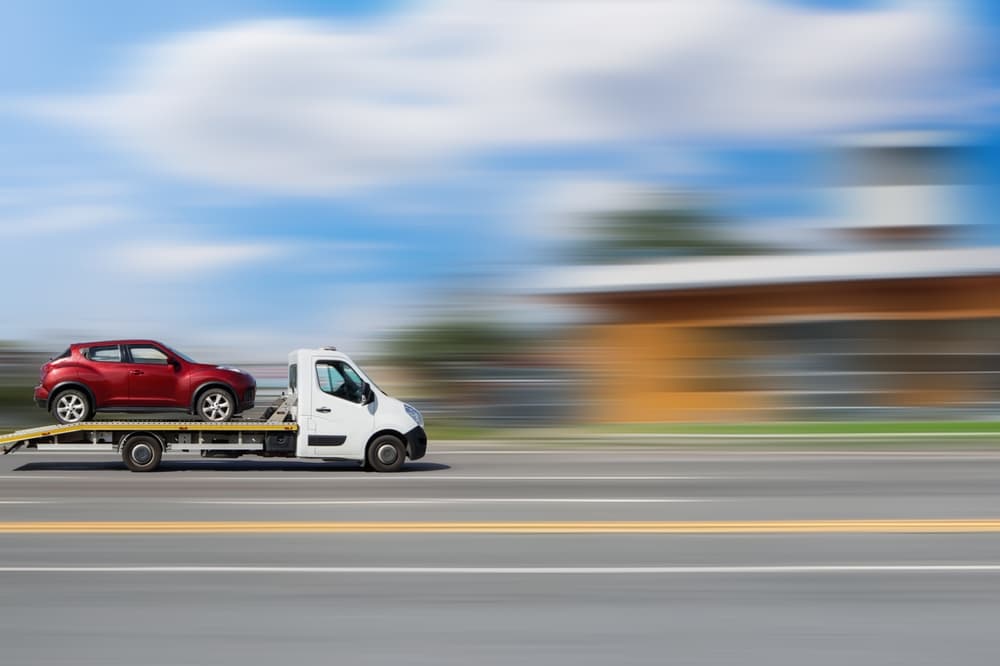
A collision with a tow truck can cause serious injuries and significant financial distress. If you were involved in a tow truck accident, you have the right to understand the applicable laws and your options for seeking compensation. A personal injury attorney can explain your rights and guide you through the legal process.
Tow truck crashes present unique hazards and complex questions of fault. A Pennsylvania truck accident attorney can help investigate the incident, gather evidence, and build a case to hold the responsible parties accountable while you focus on your recovery.
Tow trucks are essential on the road, offering important services for stranded vehicles and clearing road obstructions. However, when not handled with care, these enormous vehicles can turn highways into terrifying scenes of chaos.
Tow trucks often weigh over 10,000 pounds and are adapted to secure heavy cargo loads, making them particularly formidable in accidents.
These vehicles present unique hazards due to their extended length, exposed chains, and high centers of gravity. When involved in accidents, the aftermath can be daunting: victims may face financial upheaval, intense medical crises, and a whirlwind of legal challenges.
Your rights as a victim are important, though in the event of an accident, the agonising process of making a claim needs the guidance of a seasoned lawyer or attorney.
Accidents involving tow trucks leave many victims grappling with severe injuries and significant financial burdens. Due to the complexity of these cases, seeking legal help allows you to demonstrate the effect of the accident and pursue compensation.
The sheer size and specialized functions of tow trucks make them particularly dangerous on the road. The mechanical and operational features that enable them to perform towing services are precisely what contribute to their instability and potential threat when involved in accidents.
These vehicles are notorious for their reduced maneuverability and braking distances. The load they carry and their weight can extend stopping times significantly, compared to regular passenger vehicles.
Poor visibility is another major issue; blind spots, and poor rear visibility, make it hard for tow truck operators to see other road users. This can lead to abrupt lane changes or unexpected maneuvers.
The state of the load is just as critical. Swinging or unsecured loads — vehicles and equipment — can shift unexpectedly, causing instability.
Additionally, driver fatigue or overwork, which is common during emergencies when rapid response is required, contributes to the hazards associated with tow trucks.
Improper roadside positioning or sudden stops are additional risk factors, further complicating safe tow truck operation.
These elements combine to elevate the risk for accidents. Proving negligence in these cases often hinges on these details, emphasizing the need for a methodical investigation process.
Tow truck accidents are rarely straightforward: numerous elements can contribute, often interconnected, making the determination of fault challenging yet crucial for seeking justice and compensation.
These incidents typically involve multiple factors, including driver conduct, the company’s operational standards, and the mechanical condition of the truck and towing equipment.
Even a single act of negligence can create a chain reaction of hazardous events. Legal investigations must dig into every possible cause to determine exactly who is liable, and multiple parties may be involved.
Understanding these common causes helps injury victims recognize when another party’s recklessness may entitle them to compensation.
Operating a tow truck demands constant awareness, yet distractions such as the following remain one of the leading causes of collisions:
Tow trucks are heavy, and their added load limits their stopping ability. Speeding makes accidents far more likely. There is no excuse for any of the following behaviors, and they will make the driver liable:
Poor technique can turn the tow truck or towed vehicle into a dangerous projectile. Often, there are several factors at play:
Companies that cut corners on training put everyone at risk, with measures such as:
Mechanical failures are a major contributor to catastrophic tow truck crashes, including:
Tow trucks often operate at the roadside — any error here puts others in danger. This kind of conduct may look as follows:
If the towed vehicle detaches or shifts weight unexpectedly, the outcome can be deadly, and the following may demonstrate such negligence:
Determining legal responsibility after a tow truck accident requires a comprehensive investigation. Unlike ordinary traffic collisions, these incidents often involve multiple parties, each playing a distinct role. Victims should not assume that the tow truck driver is solely at fault — liability may be shared across several individuals, companies, or even government entities.
Understanding the full scope of who may be held accountable is essential for pursuing the compensation you deserve. A thorough legal analysis helps uncover these overlapping responsibilities and strengthens the case.
Liability may arise if the driver was distracted, driving recklessly, violating traffic laws, or operating the truck without proper attention to safety protocols.
The company may be held liable for negligent hiring, insufficient training, or failure to maintain the vehicle properly.
If the accident was caused by the condition or placement of the towed vehicle, the vehicle’s owner might share responsibility.
Service vendors who failed to repair or inspect the tow truck correctly could be held accountable for resulting mechanical failures.
In rare cases, government negligence — such as unsafe road design or missing traffic signs — may contribute to the accident.
Tow truck accidents can result in life-altering injuries owing to the significant mass and momentum of these vehicles. Victims often endure long-lasting physical and psychological effects. Seeking legal redress is imperative: the damages warranted for such serious harm can be very high.
The aftermath of a tow truck accident presents a critical period in which swift and informed action is needed to preserve your claim’s integrity. Evidence needs safeguarding, and records must be carefully managed, as delaying can unwittingly sabotage your case.
Prompt preservation of evidence is necessary. Black box data from the vehicle, dashcam footage, towing logs, and driver schedules offer vital insights into the incident. Gathering medical documentation thoroughly, from emergency room records to prescriptions, adds depth to your claim by detailing the severe personal impact of the accident.
Witness testimony becomes part of a compelling narrative, whether from nearby drivers, pedestrians, or roadside workers who can offer first-hand accounts of the event. It is essential to defer filing claims until all parties have been identified.
Every state has a strict deadline, known as a statute of limitations, for filing a personal injury lawsuit. This deadline varies significantly by state and the type of claim. For example, claims against government entities often have much shorter deadlines and specific notice requirements.
If you fail to file your claim before the statute of limitations expires, you will likely lose your right to seek compensation forever.
An attorney can tell you which deadlines apply to your specific situation.
Act swiftly to secure and marshal evidence – doing so can form the backbone of a strong case.
Accident victims may be entitled to comprehensive compensation for both immediate and enduring losses. Recognizing the scope of damages available is instrumental in crafting a claim that reflects the true toll of the incident.
Economic damages pertain to tangible financial losses. They encompass:
Compensation for emotional, psychological, and personal impacts falls into this category, covering:
Punitive damages aim to penalize especially reckless or malicious behavior, such as:
If an accident is fatal, the victim’s surviving family members or estate may file a wrongful death claim. The laws governing these claims are state-specific but generally allow eligible survivors (such as a spouse, children, or parents) to seek damages for losses that include:
Tow truck companies often ally with powerful commercial insurers, whose principal aim is to curtail payouts. The disparity between what you deserve and what insurers offer can be stark.
Insurer tactics often include:
Guard against these tactics with astute legal representation, which can ensure that your case remains on strong footing and that your rights remain protected.

Truck Accident Lawyer, Robert S. Marcus
You do not need to navigate the complex aftermath of a tow truck accident alone. An experienced lawyer can assume stewardship over your case, widening the scope for a successful outcome and ensuring that your recovery is maximized.
Key legal services offered by a tow truck accident attorney include:
Tow truck accident lawyers regularly use contingency fees, meaning their payment hinges on your case’s success, potentially reducing any financial burden on you. Engage with a lawyer who can offer a free consultation and assess your case’s strength.
First, ensure you and your passengers are safe and call 911 to report the accident and request medical assistance. If you are able, take pictures and videos of the accident scene, including all vehicles, skid marks, road conditions, and any visible injuries. Get the contact information for the tow truck driver and their employer, as well as any witnesses. Seek a medical evaluation as soon as possible, even if you do not feel hurt, as some serious injuries have delayed symptoms.
Yes. In most cases, operating a large commercial vehicle like a tow truck requires the driver to have a Commercial Driver’s License (CDL).
Federal and state regulations also dictate hours-of-service limits, drug and alcohol testing protocols, and vehicle inspection requirements for commercial operators. An investigation can determine if the driver or their company violated any of these safety rules.
In this scenario, liability could fall on several parties.
A tow truck accident is a serious matter, bringing one of life’s most stressful moments. An attorney near you stands ready to guide you through these challenging times and ensure the compensation you seek reflects the gravity of your experience.
What’s more, there is no need for financial fears when you seek a lawyer’s help: they offer free consultations and mostly work on a contingency basis. This arrangement is a beneficial, no-win-no-fee deal, meaning victims don’t have any major upfront lawyer fees.
Swiftly exploring your legal options can make a world of difference, ensuring that you build a comprehensive case and receive the restitution you deserve. Engage with a qualified Pennsylvania personal injury attorney or legal team today.
Marcus & Mack
